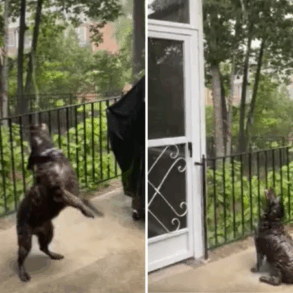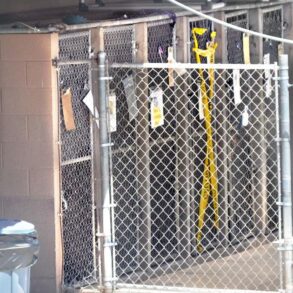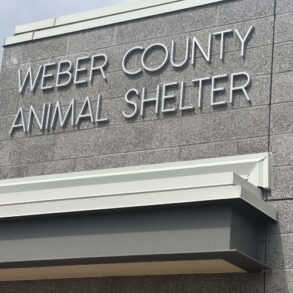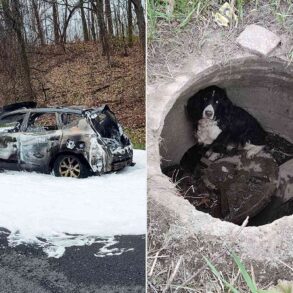
This month, Allison Cornelius witnessed the legislative committee’s support for a bill that would limit dog-chaining and mandate better confinement conditions, and was full of high hopes.
“Call me Pollyanna,” the Greater Birmingham Humane Society (GBHS) CEO told AL.com Thursday. “In the 11 years I’ve been at GBHS, I’ve never seen the committee, the Ag Committee, more favorable to the issues facing domestic animals than that committee I saw a few weeks ago.”
On April 2, the House Agriculture and Forestry Committee passed HB149, which state Rep. Phillip Ensler, D-Montgomery, sponsored.
“I was like, heck yeah, this is the year, and then it sat, and that’s when I started looking at the calendar and paying attention to it,” Cornelius said. “And I contacted Representative Ensler and I said, ‘what’s the chance?’ And he said, ‘none.’”
For Cornelius, that was like a gut punch, and she is now anxious about what would happen when Alabama faces another extreme weather event.
“That is when we see this humongous uptick,” she said.
“I wish I had a dime for every time citizens messaged me on Facebook from all over the state or call my cell phone upset because the officer goes to the scene, looks at the scene and says, ‘well, I don’t know for sure whether this is illegal’ because the current code for Alabama is not specific about what constitutes adequate shelter and nourishment and hydration.”
HB149 provides approved dog tethering and confinement methods and creates welfare standards for dogs kept outside. The bill limits dog confinement to secure enclosures with adequate space for exercise or a trolley system, with specific exceptions, including at licensed veterinary practices, boarding kennels, dog shows.
Additional exceptions include the temporary tethering of a dog at campsites, recreation areas, or homes.
The bill prohibits the indefinite use of a logging chain, choke collar, or pinch collar to tether a dog outside. It mandates that a dog confined outside must at all times have access to adequate shelter, food, and water, which the bill defines.
The shelter must be “free from accumulated waste, standing water, and debris,” and allow “the dog to remain dry and protected from the elements, including providing shade for the dog and containing adequate bedding for cold weather when necessary.”
Any violation is a misdemeanor offense, and a dog may be removed or the owner ordered to provide needed care after an hearing. And if it becomes law, the bill has an effective date of Oct. 1.
Ensler said his love for animals, especially dogs, spurred him to seek better conditions for them.
He is not alone. Beginning last summer and for many months, Madison County animal welfare advocates were concerned about certain dogs that looked neglected chained to trees at a blighted property at a busy intersection in an incorporated area of the fast-growing county, and they wanted the authority to do more.
The Madison County animal welfare director, Brad Stewart, told AL.com that since state law does not prohibit dog-chaining and does not clearly define what adequate shelter, water, and food mean, there is a limit to what he can do.
The advocates took their fight to the Madison County legislative forum which fielded questions from the public in January. In their message to the body, the advocates said the state needs a law that clearly defines adequate shelter, prohibits dog-chaining, and provides a better definition of animal neglect and abuse and when animals can be seized.
Currently, Alabama animal cruelty law makes intentional torture a first-degree felony and says it’s a misdemeanor offense if anyone “in a cruel manner” deprives “a dog or a cat of necessary sustenance or shelter.” But it doesn’t address the chaining or tethering and some of the other requirements now proposed in Ensler’s bill.
Unlike cities, which can pass ordinances through their councils, counties, which have jurisdiction over unincorporated areas, are bound by the state’s animal control law.
Stewart noted that Huntsville enforces its ordinance prohibiting dog-chaining, but Cornelius said it is a different case in Birmingham.
“We have an ordinance in the city of Birmingham that makes chaining and tethering a dog illegal, but it’s not enforced,” she said.
Cornelius points out the disconnect between the numerous calls she receives on the “horrible” situations that dogs are subjected to statewide, and enforcement actions.
The CEO mentioned a nurse who goes to work early every morning and repeatedly called her about some dogs behind a house in what she deemed inadequate shelter.
“And one morning she just called me real early and she said, ‘I’m leaving. And I just want you to know you don’t have to worry about coming out here anymore because they’re dead,’” Cornelius told AL.com.
Cornelius saw a dog with feet frozen to the bottom of a pop-up crate during a recent ice storm.
“Dog was still alive, and the officer that responded to that call wasn’t sure if he could do anything legally,” she said.
“We receive thousands of calls — not hundreds, thousands — every year from regular citizens, senators, house members, businesses, all kinds of different diversity, even law enforcement officers who are frustrated because someone has gone out to a scene and won’t do anything about an animal, that any of us from a common sense perspective would know is not going to survive under a cardboard box in 5-degree weather.”
During the cold snap early this year, she said some Alabama Legislature members told her they fielded calls from concerned citizens, and asked her what they could do.
“I said, ‘you’ve got to get this bill passed,’” she said. “And then you’ve got to make sure that law enforcement has some training to be able to know what to do.”
Ensler told AL.com he gets similar calls.
“I heard from, certainly in my district, but also throughout the state from a lot of people that were very concerned about the horrible conditions that a lot of dogs are subjected to,” Ensler told AL.com.
“People shared with me just the horrible photos and stories of dogs being chained up and treated inhumanely and kept out in just really dangerous weather conditions and outside in the freezing cold and just all sorts of situations all throughout the state where this is happening.”
According to Ensler, the language of the current animal law against cruelty towards animals in Alabama is overly broad.
”So what happens is if someone calls to report animal cruelty, if the sheriffs or animal control officers respond, right now, there’s not a lot of clarity or guidance as to what conditions are considered permissible and which ones aren’t,” the lawmaker said.
“So this (HB149) will provide much more clarity as to how you would know, if someone is keeping their dog tethered outside, that they need to have access to adequate water, shelter, and food.”
Since committee passage on April 2, the bill has been awaiting action by the full House of Representatives before it can move to the state Senate.
This post was originally published on this site be sure to check out more of their content.













































